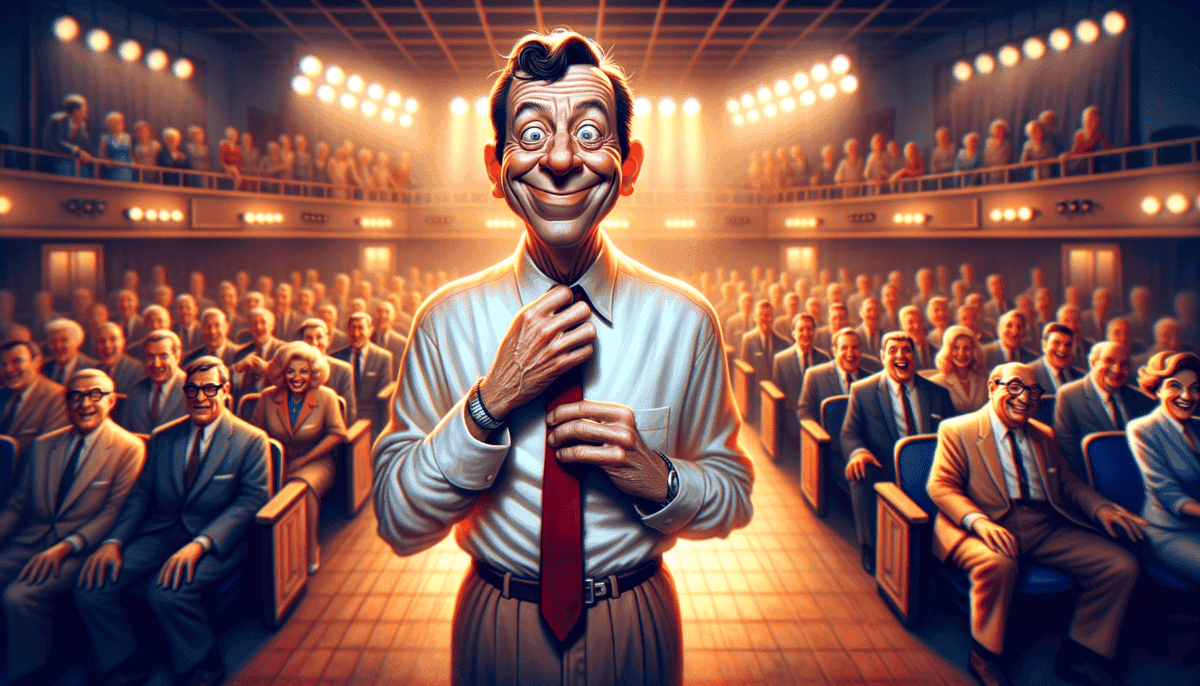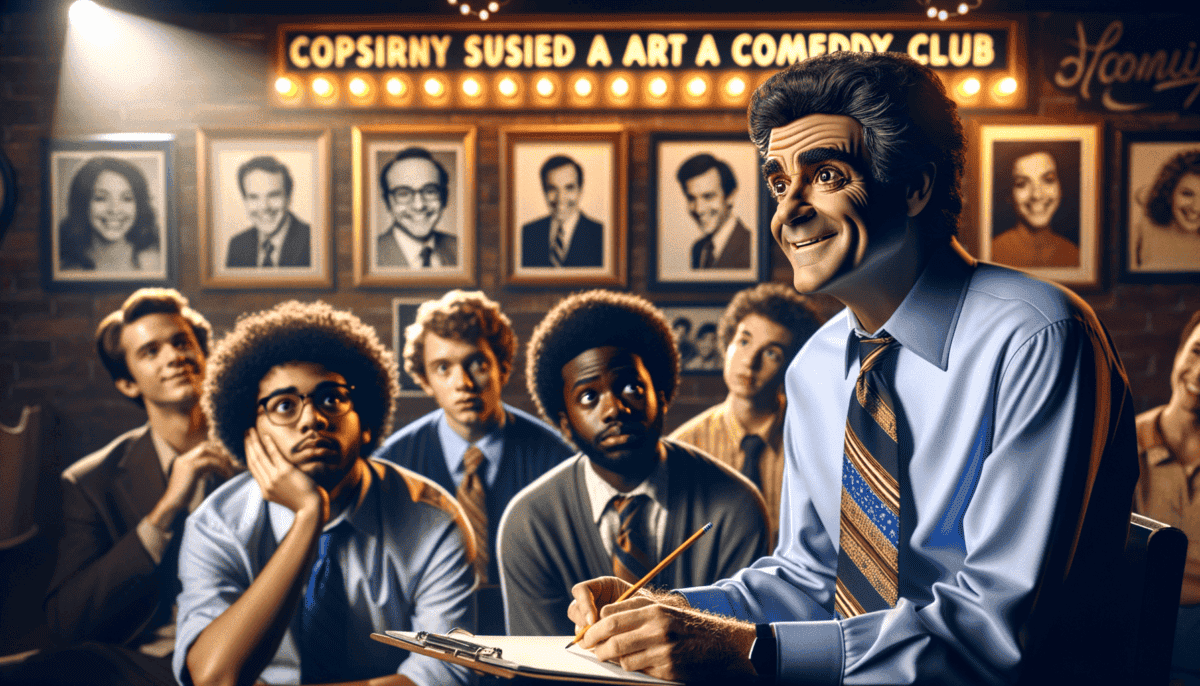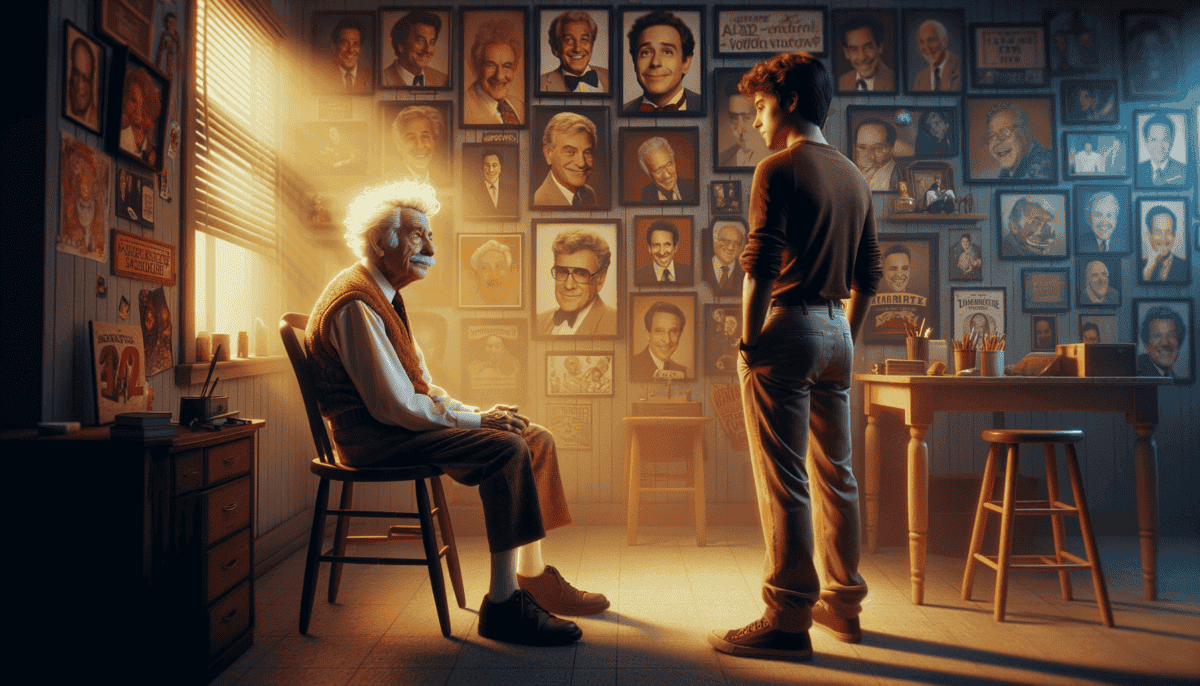A Boy Named Jacob
On a busy street in Brooklyn, New York, a little boy named Jacob Cohen lived with his family. It was 1921, and times were tough. ️ Jacob's dad worked hard selling ice cream and frozen treats from a horse-drawn wagon, but they still didn't have much money.
"Mom, why do the other kids have new shoes?" young Jacob would ask, looking down at his worn-out pair.
His mother would smile and pat his head. "We make do with what we have, Jacob. But you know what we do have? Your wonderful sense of humor!"
Making People Laugh
Even as a small child, Jacob knew how to make people smile. When other kids felt sad at school, he would tell silly jokes or make funny faces. His teachers didn't always like his joking around, but his classmates loved it!
"Cohen, stop being the class clown!" his teacher would say.
But Jacob couldn't help it. Making people laugh was what he did best. It was like magic – when people laughed, they forgot about their problems for a little while.
“I knew I was funny from when I was just a tiny kid. When things got tough, I could always make someone laugh.”
Working Hard
As Jacob got older, he had to work lots of different jobs to help his family. He delivered groceries, sold newspapers, and even worked as a singing waiter! But no matter what job he did, he always found ways to make his customers laugh.
Important Jobs Jacob Had:
• Newspaper delivery boy
• Grocery store helper
• Ice cream seller
• Singing waiter
• Paint can cleaner
Finding His Voice
When Jacob was fifteen, he started trying comedy at small clubs. He was nervous at first, but he knew this was what he wanted to do. He tried different stage names, trying to find the perfect one.
"Ladies and gentlemen, please welcome… Jack Roy!" the club owner would announce.
But something wasn't quite right. Jacob knew he needed to find his own special way of being funny. He didn't know it yet, but someday he would become someone very different – a comedian named Rodney Dangerfield!
At night, young Jacob would write jokes in his notebook. He practiced telling them in front of his mirror. Sometimes people didn't laugh at his jokes, but he never gave up. He knew that someday, all his hard work would pay off.
"Mom," he said one evening, "I'm going to be a famous comedian someday."
His mother smiled and hugged him. "I believe you will, Jacob. You just keep making people happy."
Little did anyone know that this struggling boy from Brooklyn would grow up to become one of the most famous comedians in the world. But first, he had many more challenges to face and lots more laughs to share.
The sun was setting over Brooklyn, and Jacob was dreaming big dreams. He didn't have fancy clothes or lots of money, but he had something special – the ability to make people laugh. And that was just the beginning of his amazing story.
Finding His Funny
The bright lights of New York’s comedy clubs were calling Jack Roy’s name. That’s what Jacob Cohen called himself now. He wasn’t sure about the name, but he was sure about making people laugh.
“Ladies and gentlemen, give it up for Jack Roy!” the club owner would shout.
Learning the Hard Way
Some nights were tough. Sometimes people didn’t laugh at his jokes. But Jack kept trying. During the day, he sold aluminum siding to pay his bills. At night, he told jokes at small clubs.
“Hey, I just flew in from Chicago, and boy are my arms tired!” he would say.
The jokes weren’t quite working yet. He needed something different – something that was truly his own.
“I tried everything to make it in comedy. I even tried being myself – that was the hardest character of all!”
The Comedy School of Hard Knocks
Jack learned important lessons at every show:
• Always face the audience
• Speak clearly and loudly
• Tell stories people understand
• Don’t give up when jokes fail
• Be yourself, not someone else
Every night was like going to comedy school. He watched other comedians carefully. What made people laugh? What made them stop laughing?
A Family Man’s Choice
Jack got married and had a family. He needed more money than comedy was bringing in. So he took a break from telling jokes.
“I have to think about my family first,” he told his wife. “Comedy can wait.”
But the funny bone never left him. Even while selling aluminum siding, he made his customers laugh.
The Comedy Comeback
After years away from comedy, something was pulling Jack back to the stage. He missed making people laugh. He missed the spotlight.
“I need to try one more time,” he told his wife. “But this time, I’m going to do it my way.”
He started writing new jokes. These weren’t just any jokes – they were about his life, his problems, and how nobody gave him any respect.
One night, he looked in the mirror and didn’t see Jack Roy anymore. He saw someone new – someone who was tired of not getting any respect.
“Rodney Dangerfield,” he said to his reflection. “That’s who I am.”
And just like that, a comedy legend was about to be born. The world wasn’t ready for what Rodney Dangerfield was about to bring to the stage. But first, he had to prove himself in the tough world of New York comedy clubs.
Finding His Voice
Something magical happened when Rodney Dangerfield stepped onto the stage. The nervous energy that used to hold Jack Roy back was gone. In its place was a new kind of funny.
“I tell ya, I get no respect,” Rodney said to the crowd. “When I was a kid, my family moved a lot. But I always found them!”
The Magic Words
Those three little words – “I get no respect” – changed everything. The crowds started laughing. Really laughing! Rodney had found his special thing.
“When I told my dentist my teeth were yellow, he told me to wear a brown tie!” The audience roared with laughter.
TV Time
One night, a big TV producer came to watch Rodney’s show. He loved it so much, he invited Rodney to be on “The Ed Sullivan Show.”
“My first time on TV, I was so nervous, I almost forgot to be funny!”
But Rodney wasn’t nervous for long. He told his jokes just like he did in the clubs:
“Last week my doctor told me I was going crazy. I told him, ‘Doc, if you don’t mind, I’d like a second opinion.’ He said, ‘Alright, you’re ugly too!'”
Making Friends in Funny Places
As Rodney got more famous, he met other funny people. They helped him get better at comedy. Here’s what they taught him:
• Always be yourself
• Write new jokes every day
• Learn from the audience
• Keep trying even when it's hard
• Have fun while performing
One of his new friends was Johnny Carson, who hosted “The Tonight Show.” Johnny loved Rodney’s jokes so much, he invited him back again and again!
The Comedy Club King
Rodney was doing so well, he opened his own comedy club in New York City. He called it “Dangerfield’s.” It became a special place where new comedians could try their jokes.
“At my club, everybody gets respect,” Rodney would say. “Well, except me!”
A New Kind of Star
People loved Rodney’s comedy style. He wasn’t trying to be fancy or cool. He was just being himself – a guy who couldn’t get any respect.
His wrinkled suit, red tie, and the way he pulled at his collar became famous. When people saw him, they knew they were going to laugh.
Television shows wanted him. Radio stations wanted him. Comedy clubs all over the country wanted him. Finally, Rodney Dangerfield was getting the attention he deserved.
But bigger things were coming. Hollywood was starting to notice the funny man in the wrinkled suit, and they had some big plans for him.
Lights, Camera, Laughter!
The bright lights of Hollywood were calling Rodney’s name. His funny jokes had made him famous on TV. Now it was time for something even bigger – movies!
A Golf Course Full of Laughs
In 1980, Rodney got a special call. They wanted him to be in a movie called “Caddyshack.” He would play a rich man who loved to have fun at a fancy golf club.
“On the movie set, I was so nervous, I hit the golf ball into the parking lot. But hey, at least I hit something!”
Rodney played Al Czervik, a loud, fun-loving guy who made everyone laugh. People loved him so much, they wanted to see more of him in movies.
Back to School Fun
Then came another big movie: “Back to School.” This time, Rodney played a dad who goes to college with his son.
“My son’s in college,” Rodney would joke. “He’s taking expensive lessons. $20 for an ‘A’, $10 for a ‘B’…”
The movie was a huge hit! People everywhere were saying Rodney’s funny lines:
• "I'm gonna donate a building to the college. As soon as they change the name to 'No Respect University!'"
• "Call me when you have no class."
• "The football team at my high school was so bad, every time they did a huddle, it was a prayer meeting!"
More Than Just Jokes
Making movies was different from telling jokes on stage. Rodney had to learn new things:
• Remember your lines
• Act natural
• Work with other actors
• Take direction
• Have fun!
Sometimes it was hard. Rodney would say, “I’m not an actor, I’m a reactor! When something happens, I react funny!”
Famous Friends
Working in Hollywood, Rodney made lots of new friends. Big movie stars loved working with him because he always made them laugh.
“Even when the cameras weren’t rolling,” one actor said, “Rodney was still telling jokes. He couldn’t help it – being funny was just who he was!”
The Same Old Rodney
Even though he was now a big movie star, Rodney didn’t change. He still wore his wrinkled suit. He still pulled at his collar. And he still said he got “no respect.”
“I became a movie star,” he’d joke, “but my star on the Hollywood Walk of Fame is in an alley!”
But the truth was, Rodney was getting lots of respect now. His movies made people happy. His jokes made them laugh. And everywhere he went, people smiled when they saw him coming.
The funny man from New York had become a Hollywood star. But his biggest gift wasn’t just making movies – it was helping other comedians learn how to make people laugh too.
Helping Others Find Their Funny
Rodney never forgot what it was like to be a new comedian. Now that he was famous, he wanted to help others make people laugh too!
Building a Home for Comedy
In 1969, Rodney opened his very own comedy club. He called it “Dangerfield’s.” It was right in New York City, where his own story began.
“I wanted to give new comedians what I never had – a place to be funny and learn their craft,” Rodney said with a smile.
Helping New Stars Shine
Many famous comedians got their first big chance at Dangerfield’s. Here are some of the stars Rodney helped:
• Jim Carrey
• Adam Sandler
• Roseanne Barr
• Tim Allen
“When Rodney believed in you,” Jerry Seinfeld once said, “it felt like getting a hug from comedy itself!”
Teaching Comedy’s Next Generation
Rodney loved teaching new comedians his secrets. He would tell them:
“Make them laugh with who you are. Don’t try to be somebody else. Be yourself – that’s the funniest person you can be!”
He showed them how to write jokes, how to stand on stage, and most importantly, how to get back up when jokes didn’t work.
Fighting Personal Battles
Even while helping others, Rodney had his own struggles. He sometimes felt sad or worried. But he turned these feelings into jokes that helped people feel better about their own problems.
“I told my psychiatrist that everyone hates me. He said I was being ridiculous – everyone hasn’t met me yet!”
The Brand of No Respect
Rodney’s “no respect” jokes became so famous that everyone knew them. He even wrote books about his funny life stories.
His red tie and nervous collar-pulling became his special trademark. When people saw someone doing that, they knew it was about Rodney!
Sharing the Spotlight
Even when he was super famous, Rodney always made time to watch new comedians perform. He would sit in the back of his club, laughing and taking notes.
“The best feeling,” he’d say, “is watching someone make their first audience laugh. That’s better than any movie I’ve ever made!”
A Different Kind of Respect
By helping others and staying true to himself, Rodney earned something better than regular respect. He earned the love of millions who laughed with him.
“Maybe I didn’t get respect,” he’d joke, “but I got something better – I got laughs!”
Through his comedy club and his kindness, Rodney built a legacy that went beyond his own success. He became a teacher, a mentor, and a friend to countless comedians who followed in his footsteps.
Making People Laugh Forever
As Rodney got older, he looked back at his amazing life with a big smile. From a poor kid in New York to a comedy superstar – what a journey!
A Life of Laughter
“You know what’s funny?” Rodney would say. “I spent my whole life saying I got no respect, but look at all these people who love my jokes!”
The Greatest Gift
Rodney’s biggest happiness came from making others happy. His jokes helped people forget their troubles and just laugh.
“When life gets tough,” he’d say, “the best medicine is a good laugh. And I’m like a doctor – I give out free laughs!”
A New Kind of Family
The comedy world became Rodney’s big family. Young comedians called him “Uncle Rodney” because he was always there to help them.
• Made self-deprecating humor popular
• Gave new comedians a chance to perform
• Showed that being different was okay
• Proved you’re never too old to follow your dreams
• Made the “no respect” joke famous
Always In Our Hearts
When Rodney passed away in 2004, the whole world felt sad. But then they remembered what he would want – for everyone to smile!
“Even in heaven,” people joked, “Rodney’s probably telling the angels they don’t give him any respect!”
The Legend Lives On
Today, comedians still talk about Rodney. They remember his red tie, his funny face, and his kind heart. His jokes are still making new generations laugh!
The Real Respect
In the end, Rodney got the biggest respect of all – he became one of the most loved comedians ever. His jokes will make people laugh forever.
“Life is short,” Rodney once said. “If you can make someone laugh, you’ve given them a beautiful gift.” ❤️
And that’s exactly what Rodney Dangerfield did – he gave the whole world the gift of laughter. From a struggling comedian to a comedy legend, he showed us that dreams really do come true when you never give up.
Every time someone pulls at their collar and says, “I don’t get no respect,” they’re keeping Rodney’s memory alive. His story teaches us that it doesn’t matter where you come from – if you can make people smile, you’ve already won.
Thank you, Rodney, for all the laughs!






